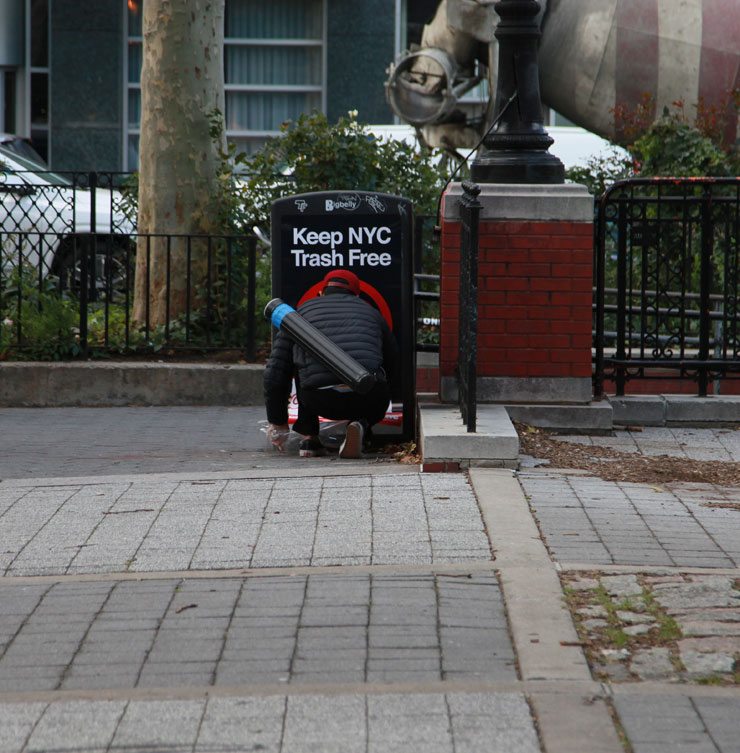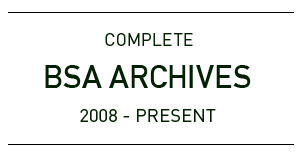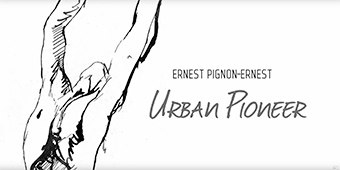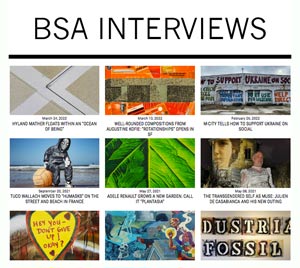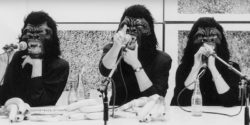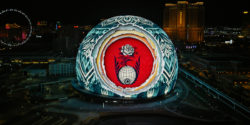“At the end of the day when one is towing the line of being provocative,” says Street Artist Winston Tseng, “you may cross that line in some people’s mind but I think if one is not trying to find that line then the work is not going to make any impact.”
Winston Tseng has probably been crossing that line, pissing off some people and making others laugh for a few years now. He appears to consider it an honor, and possibly a responsibility. Relatively new on the Street Art scene the commercial artist and art director has also created his 2-D characters on canvasses and skate decks that depict the abridged characteristics of a typecast to play with the emotions and opinions of passersby.
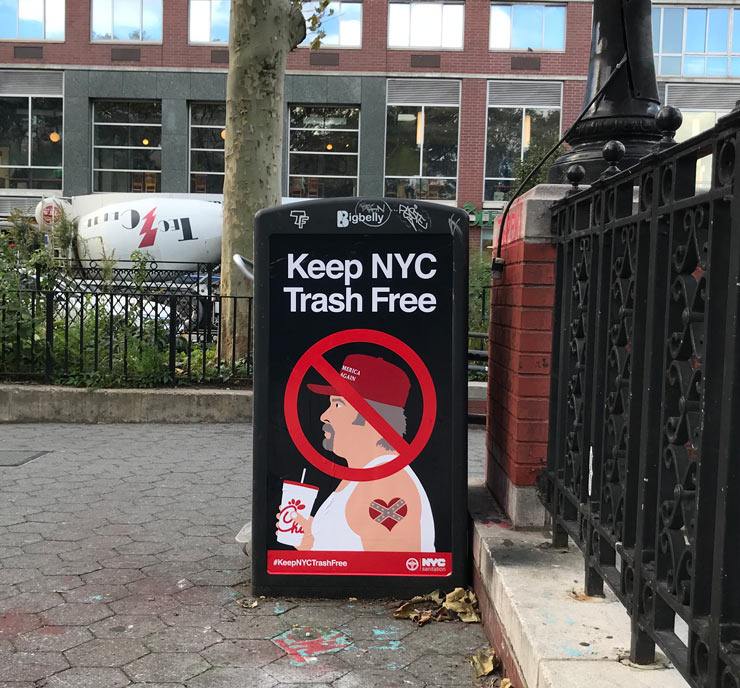
Winston Tseng (photo © Jaime Rojo)
Perhaps it is all part of a tide of the reductivist cartoonish images that are flying at you from corporate cable and corporate mainstream and corporate candidates, but you may begin to wonder if simplifying and vilifying is the result or the cause of the polarization. And as Street Art continues to reflect us back to ourselves, the satirists are quick and blunt as well. Otherwise, how could they hope to get our attention?
The stand-up comedian Lenny Bruce outraged people in the 1960s with his provocations that melded satire, politics, religion, sex, and vulgarity – even earning him arrest for obscenity. Street Artist Ron English engorged Ronald McDonald on billboard takeovers to target obesity and fast food, Jon Feckner illustrated structural racism by labeling institutional neglect of certain neighborhoods in the 70s and 80s, and politicians are routinely turned into pigs and other animals on stencils, stickers and aerosol paintings for effect.

Satire, provocative or relatively benign, can be expressed as a caricature that exaggerates qualities as grotesque; a critique with a biting jab. You will see it played out in Tseng’s other works – an iPhone chatting, Starbucks swilling white Millennial plays into stereotypes of a privileged verbally-challenged belly-gazing consumer class. An Asian woman in traditional dress waves a hand fan of dollars that confirm her drive for wealth. A fake ad for “Christian Mingle” features an older priest reciting a Madonna lyric to a younger one with an excited gaze that calls to mind the multiple Catholic pedophile scandals in the news.
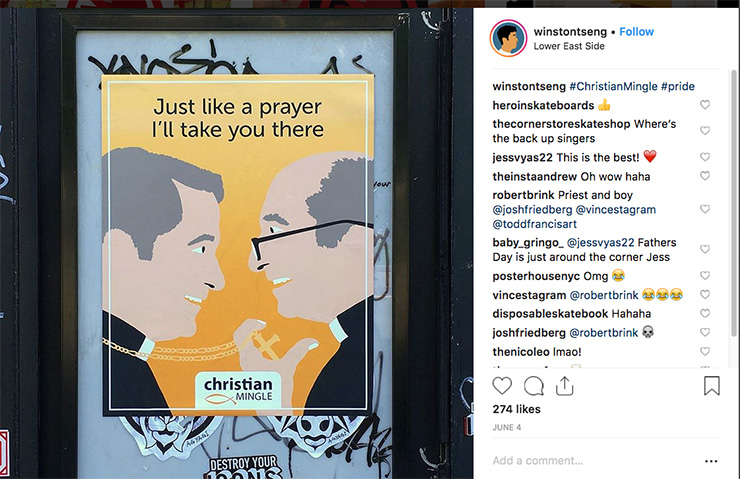
In one collection of canvasses that Tseng created for the gallery, simplified elements of typical archetypes of modern men are featured in profile – a Hasidic Jew with pais, an Arab with beard and keffiyeh, a US soldier with camo helmet, a bearded hipster wannabe with truckers cap – but each is coupled and holding one another’s face and looking into the eyes of the other. The series of pairings challenges preconceptions about masculinity, religion, societal roles, human costumery and what close physical proximity may imply.

Happily Ever After, 1-4 (2015) (© Winston Tseng)
Making fun has gotten many a Court Jester punched verbally and literally and yet everyone realizes that the truer elements of the roast are what had helped both the joke and the fist land.
Recently a poster from the street that we published on Instagram garnered praise and repudiation by commenters who didn’t like the depiction of newsreader/actor Sean Hannity extending his tongue in a fellated manner toward the waistline of a man with a long red tie.
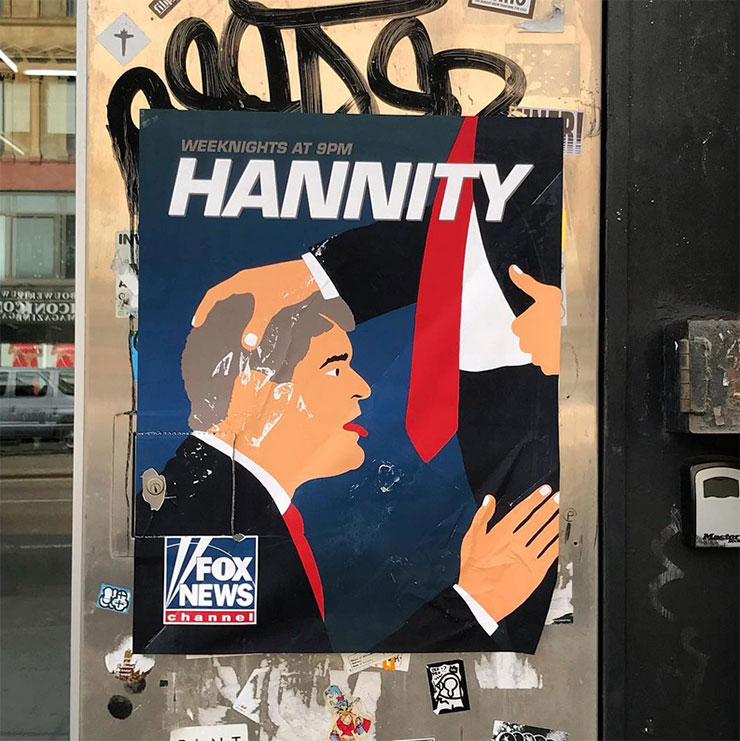
Winston Tseng (photo © Jaime Rojo)
The responses ranged from anger that it appeared to demean homosexuals, to critiquing the artists skills at political activism.
“Stop making homosexuality a punchline,” said @mollykathleenv. “How is ‘sucking dick’ activism? It’s blatant #HOMOPHOBIA you are posting under the guise of activism,” wrote @kingsquirrel.
One commenter even questioned who should be allowed criticize the street work. “It would’ve been really chill if all the straight people tapped out of this discussion. This is not for you to weigh in on tbh,” said @sameshit.
But @jeffserenius simply couldn’t stomach the image. “This is in very poor taste. Regardless of your political views. I will be unscribing after this post and will now be looking for another vendor for my photography needs … very disappointed in this.” We were, of course, devastated.
Winston Tseng (photo © Jaime Rojo)
His newest pieces on the street are pasted on garbage cans and feature people in red caps identified with the “Make America Great” slogan that Trump supporters are known to sport. In recent years using the word ‘trash’ has gone from campy to outright degradation and classicism, but the artist says he’s just venting his personal frustration at “thoughts and ideologies”, rather than actual people.
The male in a muscle t-shirt has a confederate flag tattooed in a heart shape on his bicep and is sipping from a Chic-fil-A cup, while the woman is holding a Bible under her arm. Both are stereotyped images of so-called “Trump Voters” that play dangerously into the urge to simplify or brand an entire group of people in a denigrating way. Then again, humor and insult are often found to coexist in satire. The new pieces instantly caught Manhattanite’s attention and cell phones popped out to capture the image.
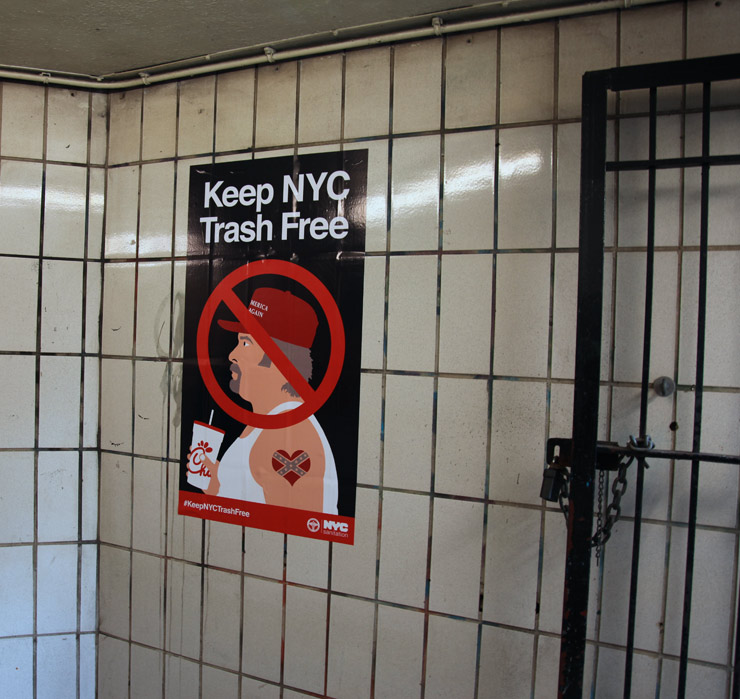
Winston Tseng (photo © Jaime Rojo)
We asked Tseng about the Hannity poster and the new MAGA pieces and what his work on the street is about.
Brooklyn Street Art: Can you talk to us about the poster from a few weeks ago depicting Trump standing while TV personality Sean Hannity is on his knees in front of him with his face at Trump’s crotch level? It was controversial. Some people from the gay community saw it as a homophobic and other people from the gay community as well didn’t see it that way. What was your intention?
Winston Tseng: Certainly it wasn’t my intention to convey a homophobic message or ideas. But I do understand why some people would interpret it that way. For me the idea was to portray an inappropriate relationship between the subjects. On the street, with this medium, people only have a very short attention span so I was trying to make an impact and get that attention. I chose the act depicted in the poster as the most impactful. Some people saw it the way I meant it to be seen and some people saw it differently. At the end of the day when one is towing the line of being provocative, you may cross that line in some people’s mind but I think if one is not trying to find that line then the work is not going to make any impact.
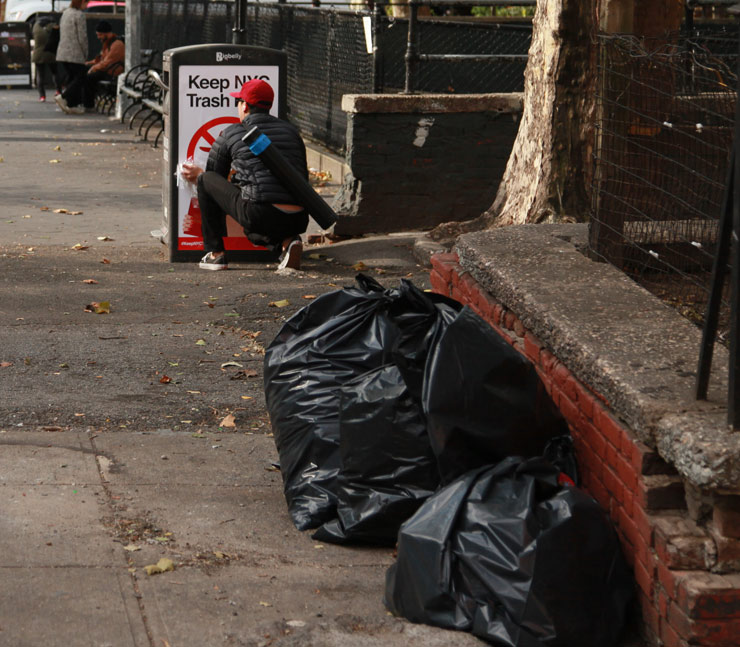
Winston Tseng (photo © Jaime Rojo)
BSA: So that brings us to the new series you just created and installed: Your subjects are white people only and you are calling them ‘trash’.
WT: I wouldn’t say its meant to represent all caucasians but certainly they are meant to portray a certain demographic. In this case a segment of white people that I personally believe the posters accurately reflect. The statistics are there that a lot of Trump supporters who wear the MAGA hats come from red states, from the south, and are Christian Evangelicals. Those are the concepts that I included on these posters. I didn’t make that up. I’m just reflecting something that is a quantifiable fact.
BSA: Are these posters a direct critique on Trump’s policies and ideologies?
WT: Yes. But I feel like criticizing Trump, because he kind of doesn’t seem to really believe strongly in any ideologies or policy, is not the source of the issue in my mind. The source of the issue is the segment of America who supports him and authorizes him to make the decisions that he makes. I’m not sure if he believes strongly in them or if he is just pandering and just wants to win a popularity contest amongst certain demographics. I think that there’s a lot of anti-Trump art work out there, but taking a step back one realizes that he is not doing this on his own and the same goes with the policies he announces where he just tells people what they want to hear.
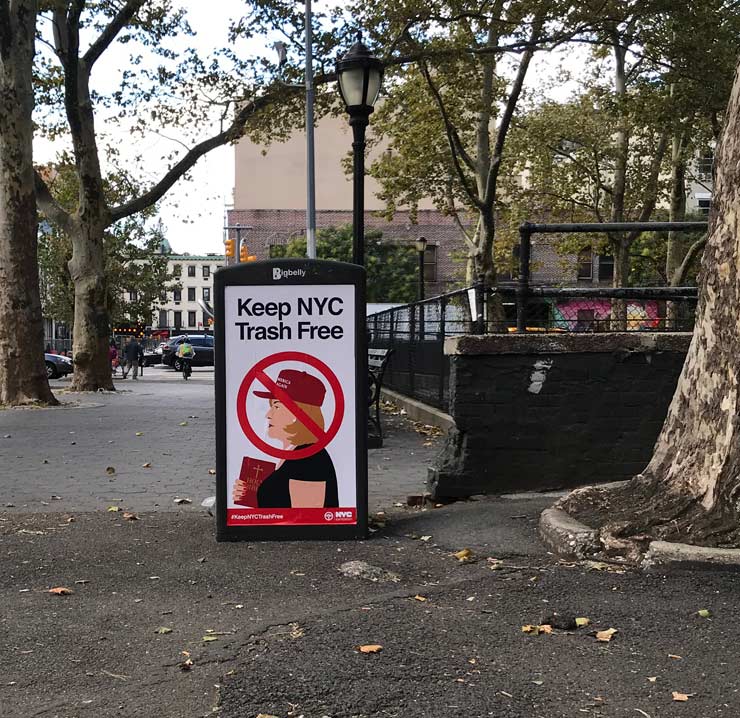
Winston Tseng (photo © Jaime Rojo)
BSA: Do you think that his aim is to distract the public from more serious issues?
WT: I don’t think he is distracting away from serious issues, but rather he brings into focus other serious issues that a certain segment of the population, myself included, don’t agree with him on. I think he’s reflecting a lot of hate and ideologies that exist in the population. That’s what I’m trying to get out with this series. Put the focus a little bit less on him being the creator of all of this but rather on his supporters who share the same beliefs and those beliefs that get reflected through him.
BSA: Do you think his supporters weren’t aware of how they felt or when he came out they felt that they had permission to air their beliefs in public?
WT: I think it’s probably the latter. I’m certainly not an expert on this. I know as much as any other American does in public. But yes, I don’t think he created these beliefs but people were harboring these thoughts and feelings. We are just in a time period now where is more acceptable to express those thoughts and ideologies more openly.
BSA: What was your goal when you were creating these series?
WT: It’s always just a personal expression. I’m not one to think that I’m going to change anyone’s mind by doing this. There’s a bit of humor in it and I’m hoping that people are entertained by it. I think that the majority of New Yorkers would probably agree with that just based on the statistics of liberals versus conservatives in New York. So it’s personal expression. It is the entertaining factor. It is sort of a stress relief for me, just to get it out there.
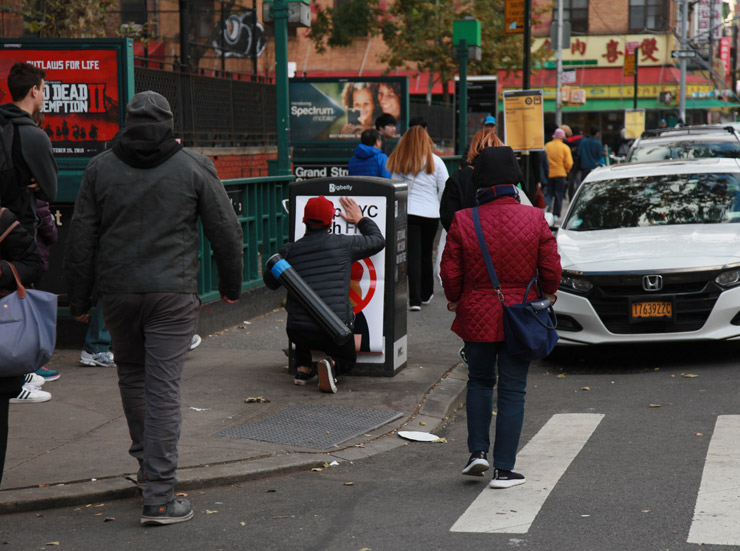
Winston Tseng (photo © Jaime Rojo)
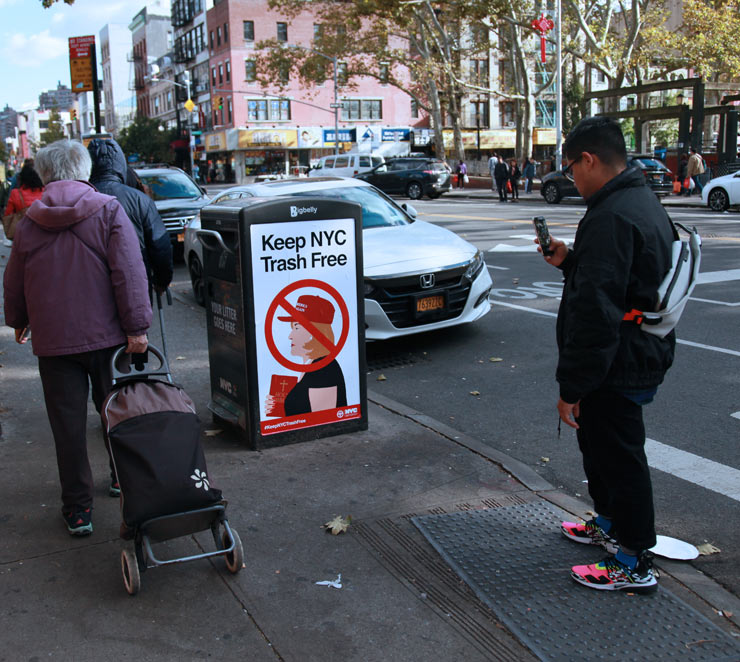
Winston Tseng (photo © Jaime Rojo)
Other Articles You May Like from BSA:
Whose voice gets to be heard, and at what cost? It’s an ongoing battle with companies and politicians and citizens fighting to control the radio airwaves, broadcast television, cable providers, news o...
The 6th Marrakech Biennale brings a number of parallel projects into the Medina this year, including performances and public education programs. MB6 Street Art brings the art to the streets for both...
Welcome to BSA Images of the Week. The revolution has begun. When a socio-political-economic nexus is forged with such historically contentious factors, it only takes a spark. If you are w...
Summertime spray-cations are as popular for the jet-setting aerosol explorer as much as your local graffiti and Street Artist. Grabbing your bicycle, taking a bus, or simply hiking with a backpack fu...
Italy’s Mr. Fijodor has three new projects to share with BSA readers that he recently completed, despite the obstructions that have affected “normal” life. “Some works have been interrupted, some...
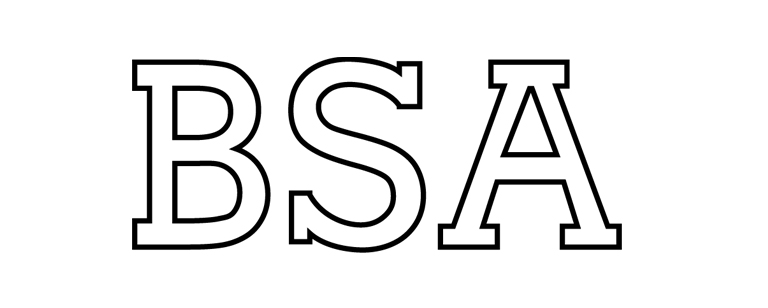 BROOKLYN STREET ART LOVES YOU MORE EVERY DAY
BROOKLYN STREET ART LOVES YOU MORE EVERY DAY
